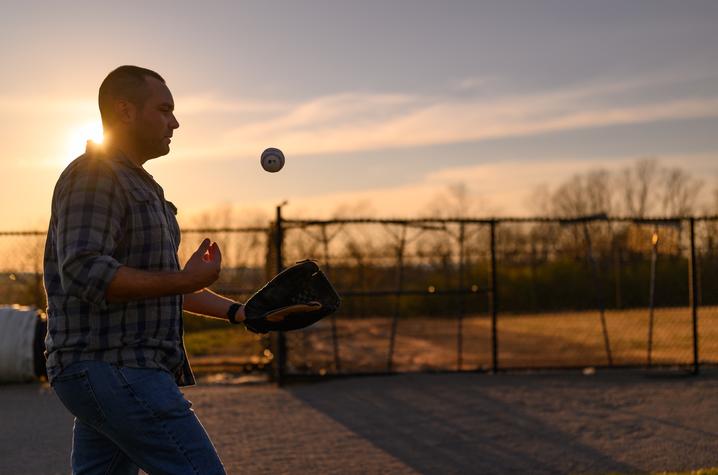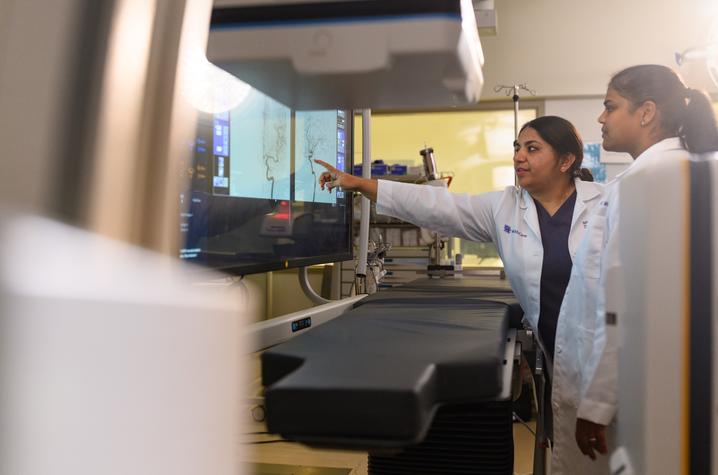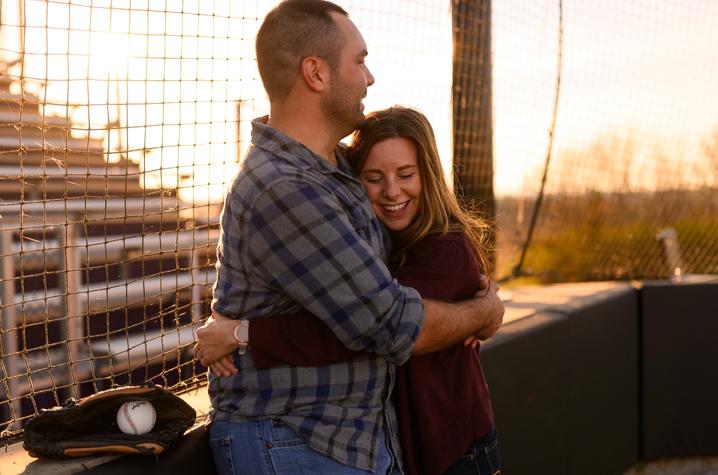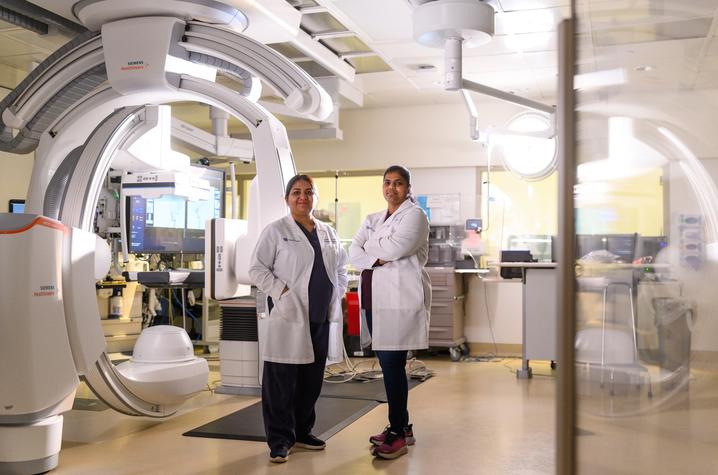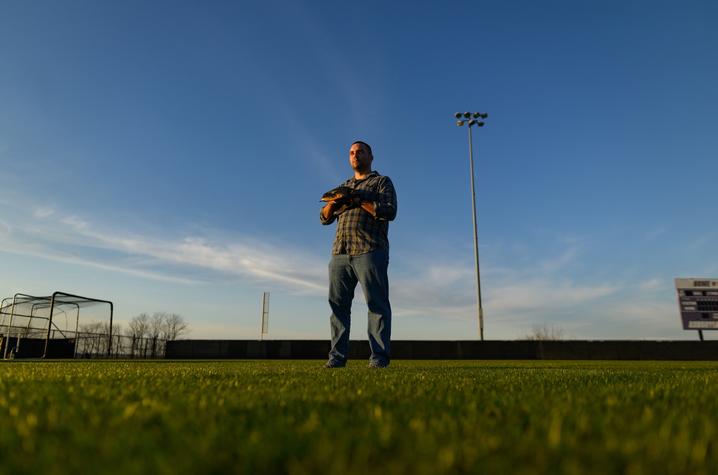Police sergeant ‘making full use of the life he got back’ thanks to UK HealthCare
LEXINGTON, Ky. (Dec. 21, 2023) — “We do not want to forget how close he came,” said Martha Groppo. “It’s easy once life resumes to normalcy to take it for granted.”
It has been about a year and a half since Martha consented to an emergency surgery for her husband, not knowing what their life would be like on the other side of the procedure.
“I got a call that my healthy, young husband who was out playing softball with his friends is suddenly within minutes of dying,” she said.
Martha received that phone call while at home with their 9-month-old daughter. Thankfully, her mother was there too so Martha could quickly get on the road to the emergency department at University of Kentucky Albert B. Chandler Hospital where Scott Evely was being taken by ambulance.
*****
Scott Evely and Martha Groppo have been friends for pretty much as long as they can remember.
“Since we were like 5 or 6,” said Scott. “We were just always in the same friend group and we were on the same swim team growing up.”
The two lifelong friends eventually began dating each other all toward the end of college, maintained a long-distance relationship for six years while Martha was in graduate school, and then got married.
“Scott is my one and only,” said Martha. “We literally grew up together. He was a super good friend long before we were husband and wife.”
Knowing the background of the two makes it easy to understand Martha’s thoughts as she made the drive from their home in Wilmore to Lexington on June 30, 2022. “I was thinking, there will never be another Scott. How am I going to ever do this alone?”
Accepting and understanding Scott's safety might be at risk was actually not something new for the couple. He is a member of the Lexington Police Department and at the time was a detective in the Violent Crimes Unit.
“Several people at the hospital recognized Scott because his work would take him there a lot,” Martha said. “There was a lot of confusion about if he was injured in the line of duty rather than playing softball.”
When Martha arrived at the hospital, Scott was already intubated with multiple IVs in place.
“Everyone was scrambling because he was so young, and no one was quite sure what was happening,” said Martha. “Scott couldn’t communicate and I wasn’t there to see what exactly happened.”
*****
Playing softball in his spare time at Sims Park in Wilmore is something Scott has done for years.
“This was a church league softball game and I was playing in the outfield,” he said. “There was a ball that ended up being a home run by a decent amount, but I was running full speed and hit the fence trying to catch it … which is not an unusual occurrence for me.”
What was unusual, though, was the strange feeling Scott began experiencing in his head along with ringing in his ears.
“I remember wanting to talk but not being able to and then not being really able to move,” said Scott. “I’m very much a ‘rub some dirt on it’ kind of guy and thought maybe I had a concussion or just got the wind knocked out of me.”
Scott remained unable to communicate with those around him, but was aware he was being loaded into an ambulance and was headed to the hospital.
“I was still thinking, ‘This is going to be so embarrassing because I’m going to get there and I’m going to be fine.’ That it’s a concussion and they went through all this for nothing.”
Once at the hospital, one of the last things Scott remembers is being taken to get a brain scan and having trouble breathing. Initially, providers first thought he might be experiencing seizures from head trauma.
“The emergency department staff came back and tried to fill me in,” said Martha. “They said that during his scan, he had stopped breathing. And that the initial brain scan wasn’t showing anything wrong, but that he was now behaving like he was having a stroke. You obviously don’t expect a 32-year-old man to have a stroke.”
As the team worked to keep Scott alive, a resident from UK College of Medicine’s Department of Neurology quickly arrived to examine him.
“She was in deep anguish, but she trusted me 100%,” said Rani Priyanka Vasireddy, M.D., recalling her first meeting with the Evelys.
“She is our hero and truly cut through the chaos of that moment,” Martha said. “She brought a calm confidence to the room.”
With Vasireddy now at their side, Martha’s sister, Sarah, was able to get someone on the phone who witnessed what happened to Scott on the softball field. Sarah, who has a health care background, also strongly advocated for Scott to be given the clot-busting drug known as TPA. With this new information, Vasireddy developed a theory about what was going on and wanted to get a neurology exam done as quickly as possible.
“A big clue for me was that he was trying to say something, but he couldn’t, and he seemed frustrated. Based on that and the description of what happened, I believed he experienced high velocity trauma that can cause what is called a ‘vertebral dissection,’” said Vasireddy. “If your vertebral artery dissects, it can throw a clot that goes into the basilar artery, which is one of the main arteries that supplies blood to your brain.”
She theorized that when Scott hit the fence, his neck snapped in a way that caused an arterial dissection. Vasireddy quickly called her attending physician to take a look at her theory, which he confirmed. She then quickly called Shivani Pahwa, M.D., neurointerventional radiologist and director of UK HealthCare’s Spine Neurointerventional Services, who was on call that night. Pahwa reviewed the scan and confirmed the basilar artery was blocked.
“These brainstem strokes can present as seizures, which is something all residents should know. Because if you don’t think of it, you’ll miss it,” said Vasireddy.
The situation was dire. A common phrase amongst stroke experts is “time is brain” — the longer the brain goes without oxygen, the higher the chance for severe damage or death.
“A patient with acute stroke loses millions of brain cells every minute,” said Pahwa. “Without treatment to open up the basilar artery this condition carries a mortality rate of 85-95%.”
The basilar artery supplies blood to the critical centers of the brain that control breathing, heart rate, consciousness and movement. Every step from diagnosis to removal of the clot is critical and doctors say any delay can adversely affect the long-term functional independence for the patient.
At this point, it had been three-and-a-half hours since Scott collided with the fence. Thankfully, that meant he was still within the four-hour window needed to be given the clot-busting drug, ahead of a procedure known as a mechanical thrombectomy. Pahwa and her team wanted him to undergo the surgery immediately.
“Dr. Vasireddy came to me and said they needed to rush him back for emergency surgery and that he might not make it through — but if we didn’t operate, he would probably die within the hour,” Martha said. “It was very difficult news to deliver, but she delivered it in the way I needed to hear it.”
With family, friends and Scott’s fellow police officers waiting alongside her, Martha says they also knew that hundreds throughout the community were praying for the doctors and for Scott to make it through.
“We were scared and devastated. But we also knew we had a very skilled surgeon who was on hand that night, and we were brought to the only hospital in our area that could have handled such a severe situation,” said Martha.
The young wife and mother was warned before the surgery that if Scott survived, he potentially might not be the same.
“They said cognitively, physically, speech, motor skills, emotionally … it was all just a question mark of how much damage had occurred while we were trying to figure out what was wrong with him,” said Martha.
Now with an understanding of what was going on and a plan in place, Pahwa and her team conducted a mechanical thrombectomy to pull the clot out of Scott’s brain as quickly as possible. For the procedure, she inserted a long tube through the groin area all the way up to the blocked artery in the brain.
“This was a tenacious clot,” said Pahwa.
Meanwhile, Martha waited for any news on her husband.
“I had so many thoughts running through my mind — about if he survived, how different he might be when he woke up,” Marth said. “I had a toddler at the time, and I was just thinking, ‘How would I take care of him? How would I teach him to talk, or to walk or even eat again?’”
The "tenacious" clot required five attempts to remove. But after the fifth attempt, full blood flow was re-established to Scott’s brain.
*****
Scott spent the night recovering with Martha by his side. All her questions remained.
“But then the next morning, he was able to squeeze my hand,” said Martha. “And in those early morning hours, we began to get him to respond verbally a little bit.”
Over the course of the day following his life-threatening accident, Scott began to communicate effectively and even realized he had severely sprained his ankle when running into the outfield fence.
“One of the first things he said when he came to us was, ‘Did we win?” said Martha.
“They made us forfeit; can you believe that?” said Scott jokingly.
By the next morning, he was walking down the hallway with crutches … but only because of the ankle injury and not because of any sort of cognitive decline. He passed all the needed tests; by that evening, he was active, chatty and ready to go home.
“I was nervous, but he was driving me crazy in that hospital,” Martha said. “They said that he would actually probably do really well at home with some stimulation and loved ones around.”
After what was a completely unexpected whirlwind of 48 hours, Scott and Martha were headed home to be reunited with their 9-month-old daughter.
“She had actually started trying to walk that week,” Marth said. “I was like, ‘Please stop for a few days, we are trying to keep your dad alive!’”
Luckily, Scott made it home to witness those first baby steps.
“To walk out of the hospital after that big of a stroke is miraculous,” said Vasireddy. “It has been one of the most fulfilling things I’ve seen in my four years of residency.”
*****
Scott jokingly says the sprained ankle took him longer to recover from than the stroke. The 32-year-old wore a heart monitor for a month and underwent various scans to systematically rule out any other underlying cause that could have contributed to what happened. Aside from the arterial dissection, Martha says results showed nothing else wrong with him.
Scott was able to return to work with the Lexington Police Department and remained on light duty while his artery continued healing. As fate would have it, Scott was up for the promotion process shortly after his return.
“This was a huge blessing and provided peace of mind. He went through months of so many different kinds of tests,” said Martha.
Scott took a 100-question exam that covered hundreds of pages of laws and policies, underwent an in-person interview, and had to run through various scenarios on the spot. He finished in the top 10 for the department and was promoted to sergeant within weeks of the one-year anniversary of his stroke.
“I thought, ‘Wow! He really is back to normal,’” said Martha.
That was a big achievement for Scott and his family in the year that followed his freak accident. However, it wasn’t the biggest thing — this past summer, the family welcomed their second daughter.
“Indirectly, our youngest daughter also owes her life to Dr. Vasireddy and Dr. Pahwa,” said Martha.
“These stories are why we work hard,” said Vasireddy. “Seeing him be successful after the stroke and make full use of the life he got back by helping more people and growing his family is really very inspiring.”
Scott has helped close at least 50 cases since the accident, bringing some closure and clarity to crime victims and their families — and importantly, he is still a husband to Martha and a dad to Juliet and Florence.
“I think of this all every time I see him with our kids — because one of our kids would not exist, and the other one would not have a dad,” said Martha.
The Evely family plans to reflect and remember June 30th each year as Scott’s "strokeversary." When they think about this day, they say they immediately think of all the doctors, nurses and other staff members they encountered on UK HealthCare’s stroke team and in the ICUs.
“We want to give credit where it is due. I’m sure a lot of other patients would express appreciation, but not all those who experience a massive stroke like Scott can tell their story,” said Martha. “We are thankful God sent such talented doctors Scott’s way, and they used their skill to be the answer to so many prayers.”
UK HealthCare is the hospitals and clinics of the University of Kentucky. But it is so much more. It is more than 10,000 dedicated health care professionals committed to providing advanced subspecialty care for the most critically injured and ill patients from the Commonwealth and beyond. It also is the home of the state’s only National Cancer Institute (NCI)-designated Comprehensive Cancer Center, a Level IV Neonatal Intensive Care Unit that cares for the tiniest and sickest newborns, the region’s only Level 1 trauma center and Kentucky’s top hospital ranked by U.S. News & World Report.
As an academic research institution, we are continuously pursuing the next generation of cures, treatments, protocols and policies. Our discoveries have the potential to change what’s medically possible within our lifetimes. Our educators and thought leaders are transforming the health care landscape as our six health professions colleges teach the next generation of doctors, nurses, pharmacists and other health care professionals, spreading the highest standards of care. UK HealthCare is the power of advanced medicine committed to creating a healthier Kentucky, now and for generations to come.





